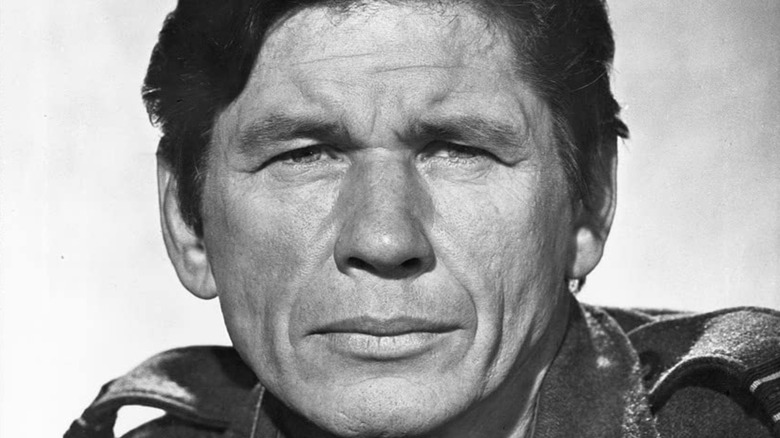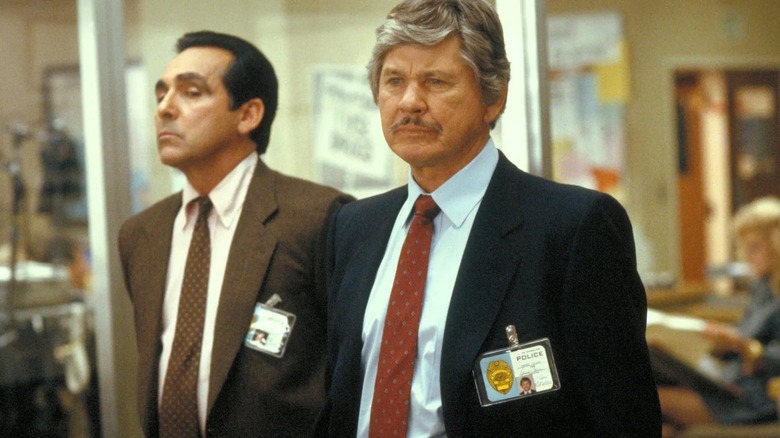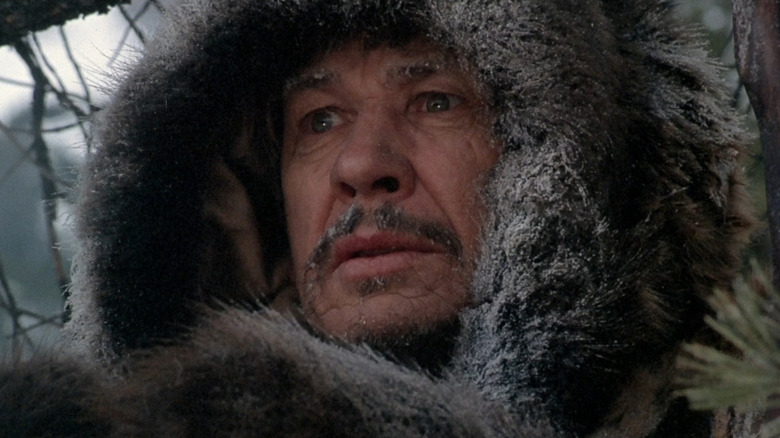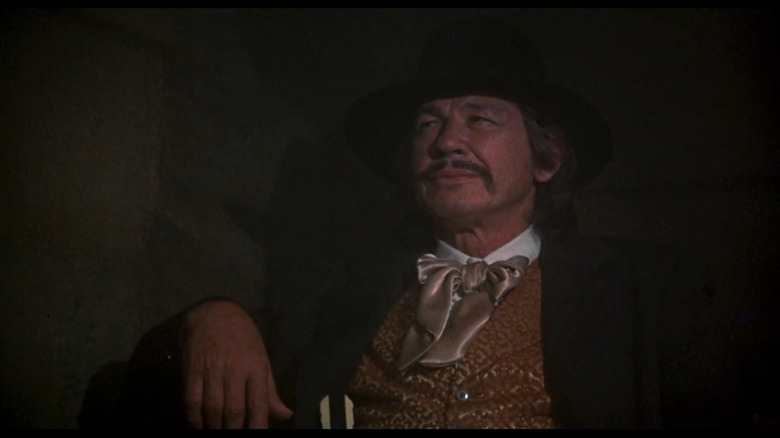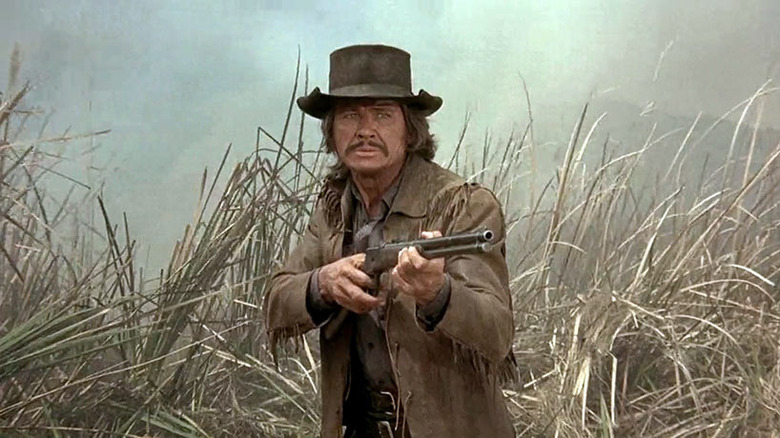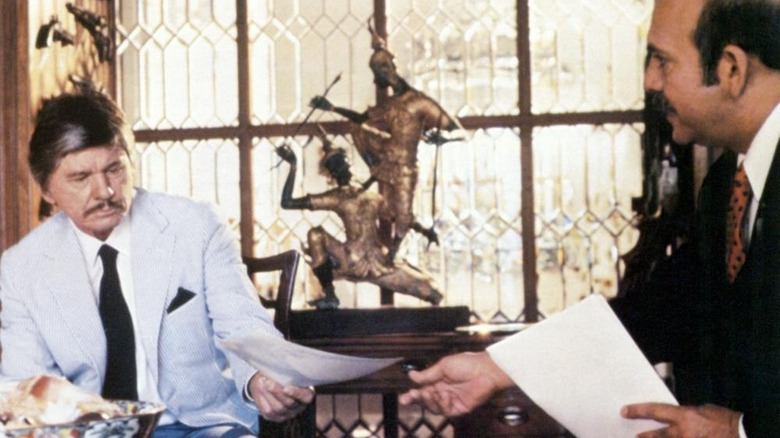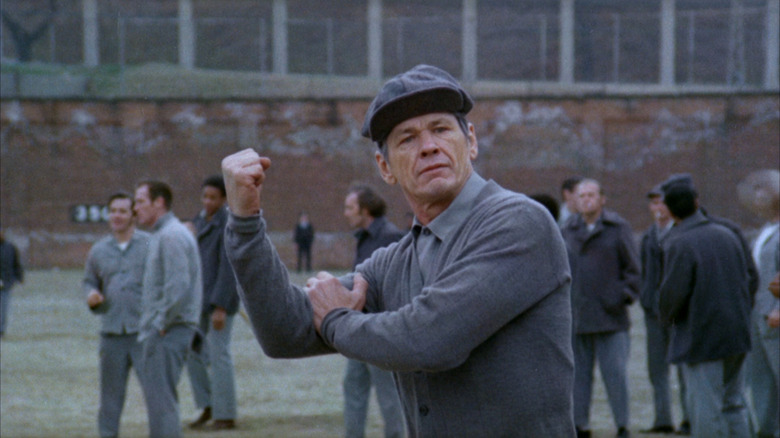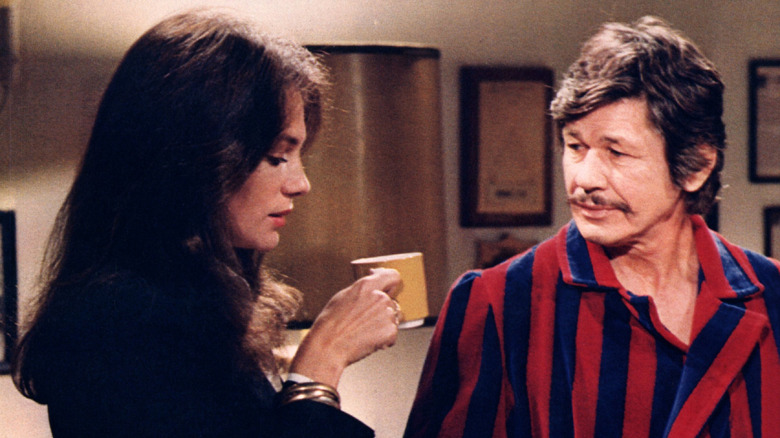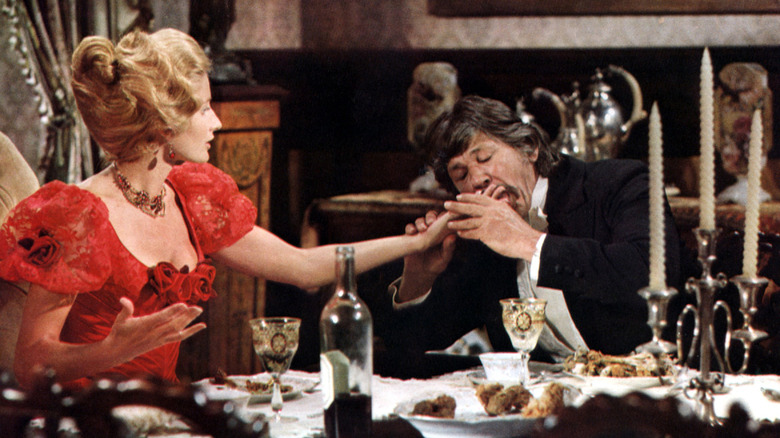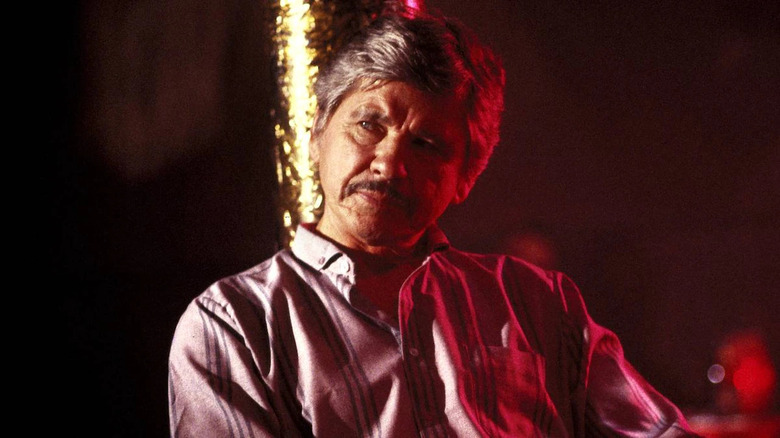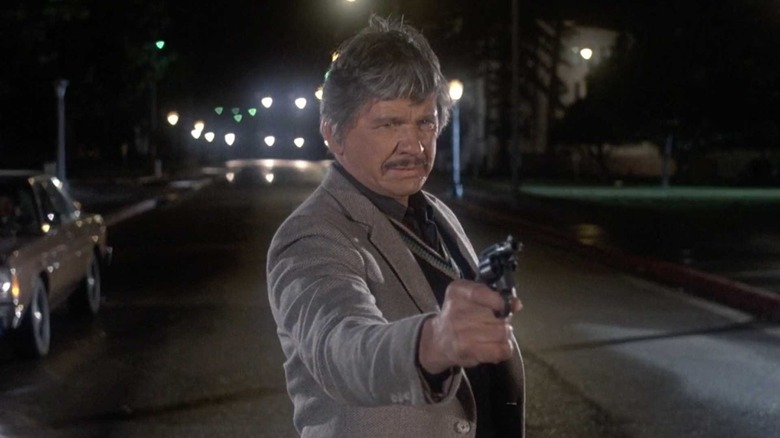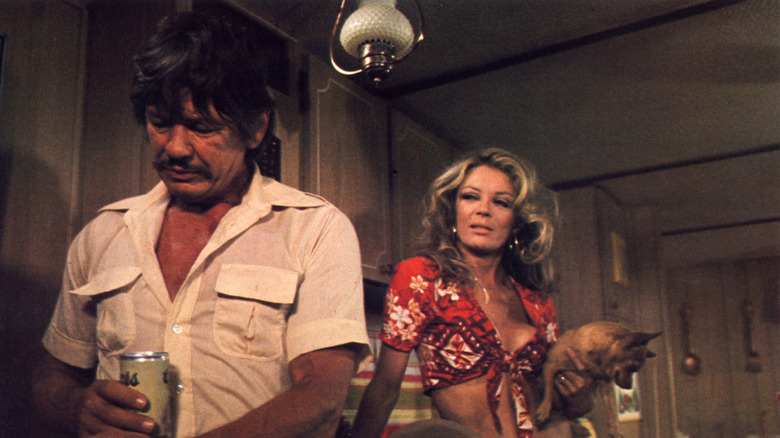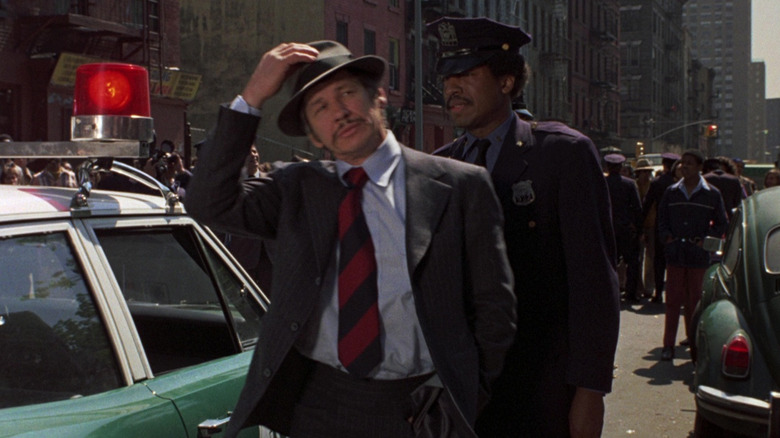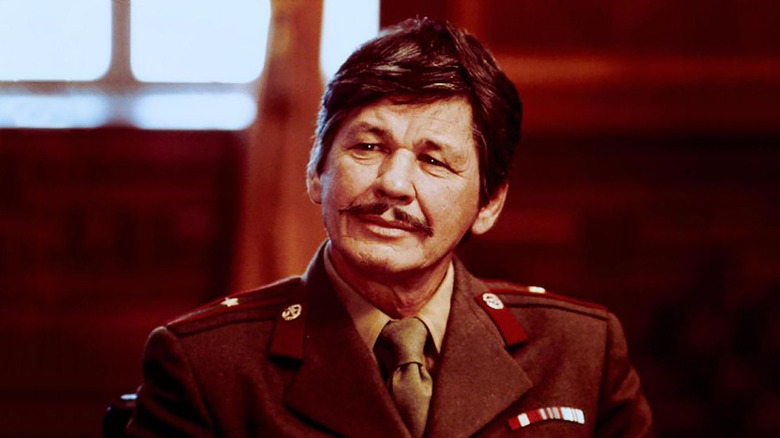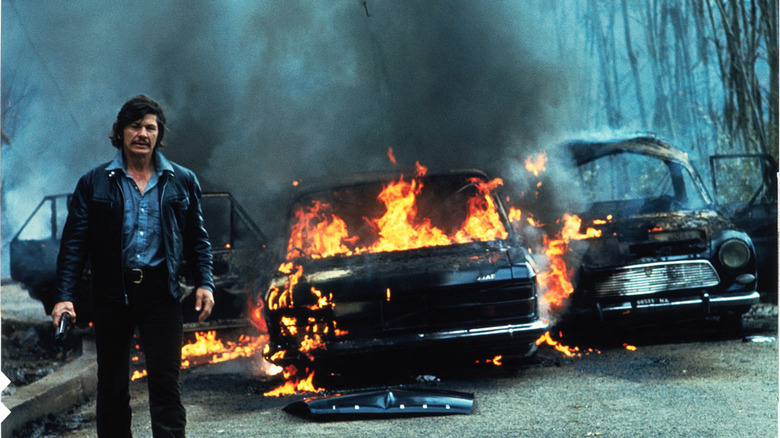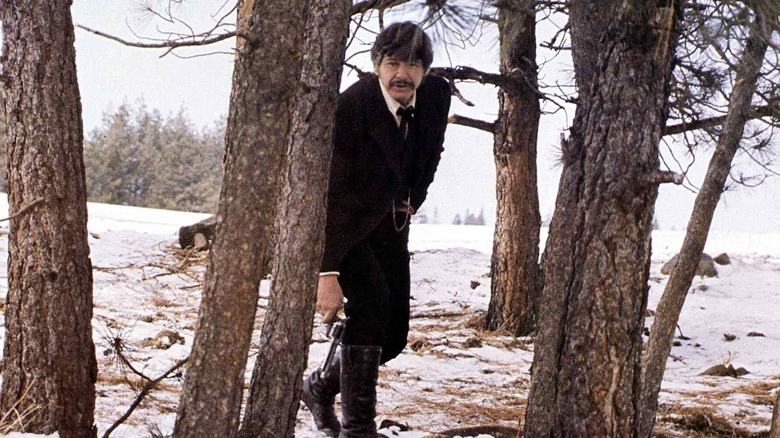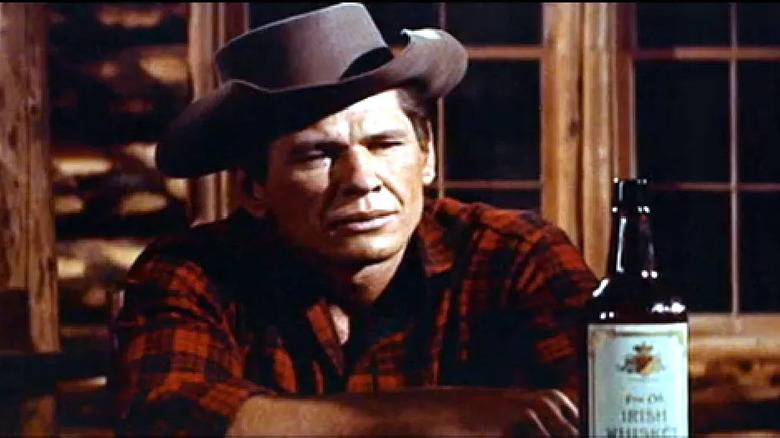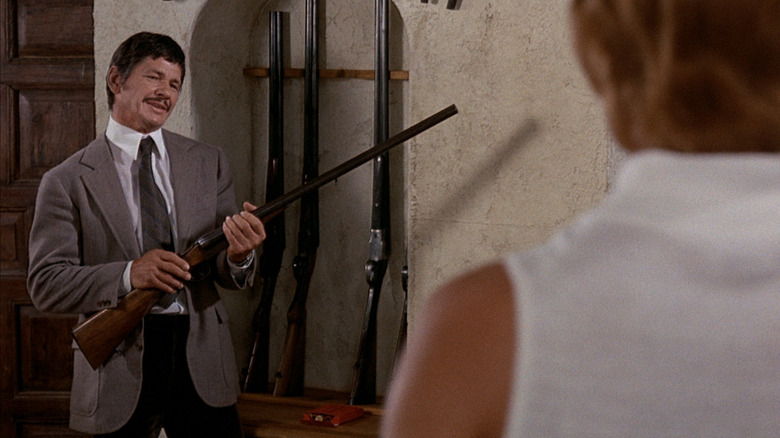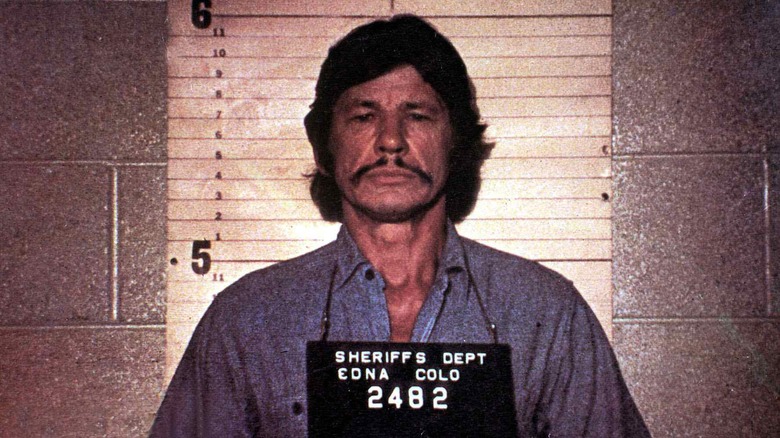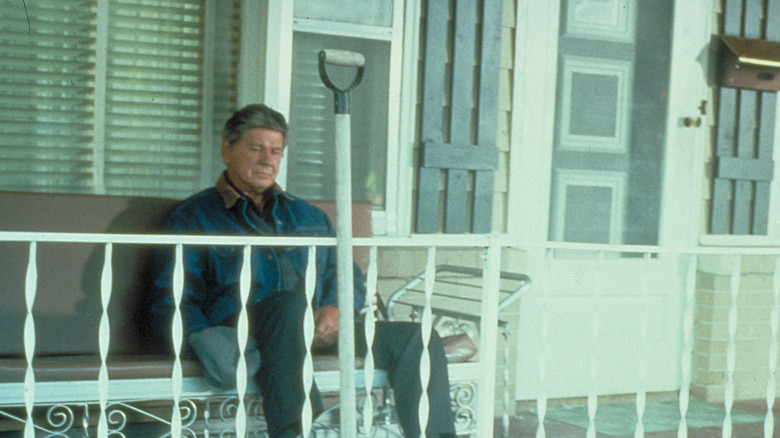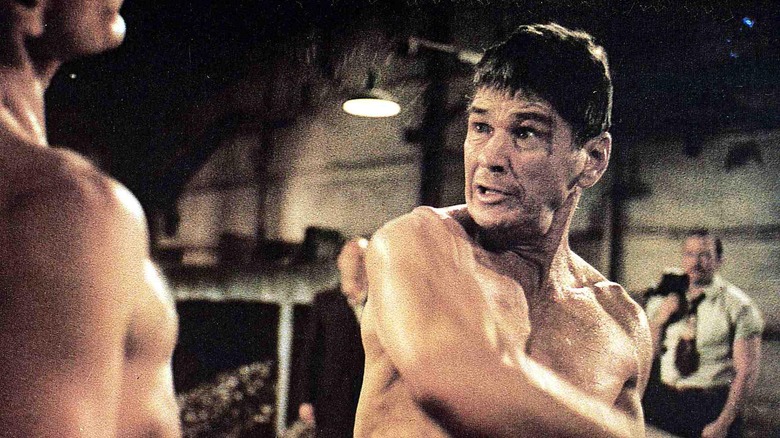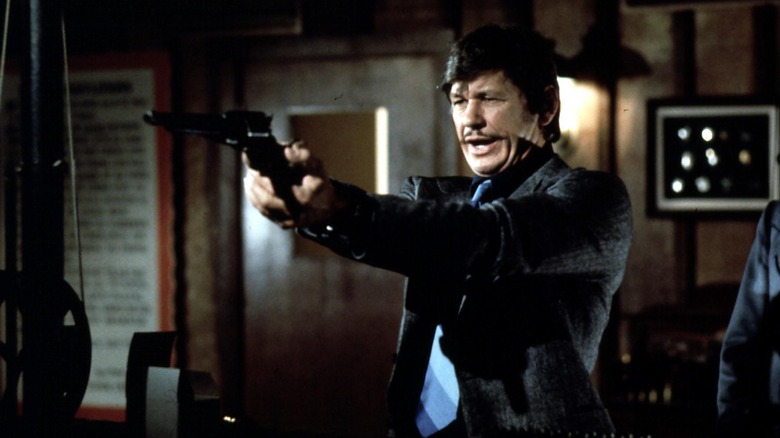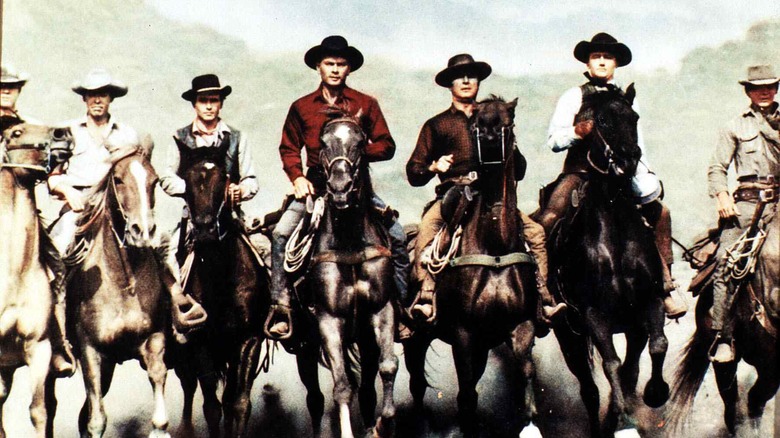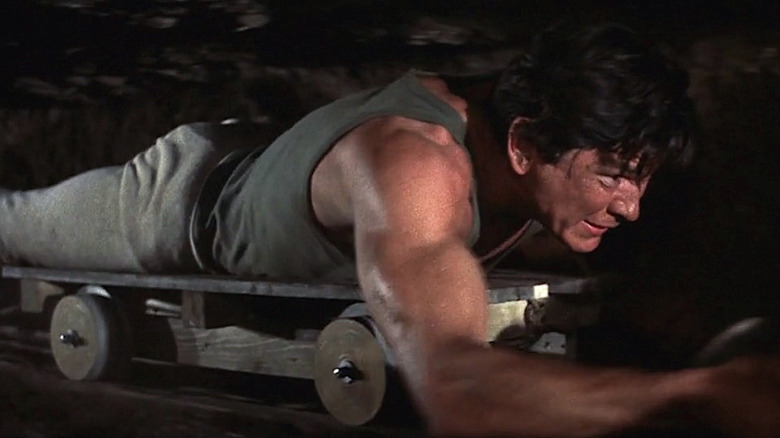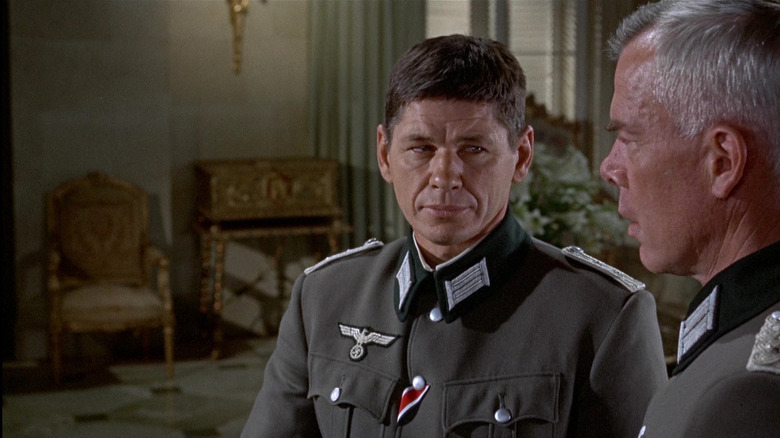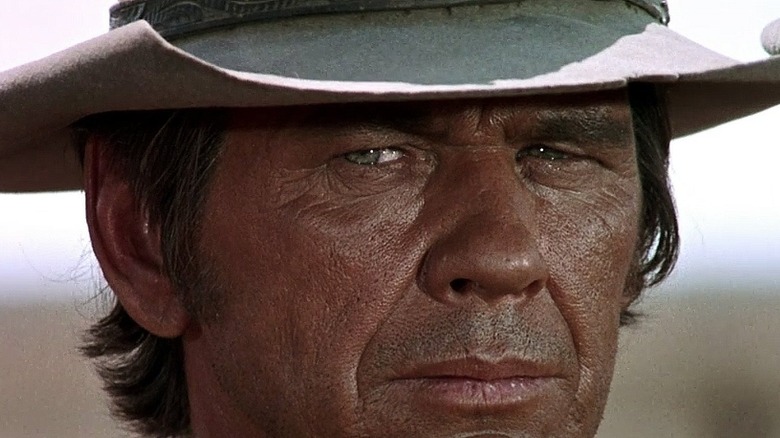Charles Bronson's 25 Most Memorable Movies Ranked Worst To Best
He's remembered as a cinematic icon today, but it took Hollywood a long time to warm up to the idea of Charles Bronson as a movie star.
Born in 1921 as Charles Buchinsky, he served in the Air Force during WWII before turning to acting, with early roles in films like 1952's "Pat and Mike" and uncredited work in the 1952 Judy Holliday vehicle "The Marrying Kind." After changing his last name during the House Un-American Activities Committee proceedings (he was afraid Buchinsky sounded too Eastern European), Bronson continued to slowly but steadily gain larger roles throughout the 1950s, specializing in Westerns, noirs, and action movies, almost always playing the heavy. He also found early work in the emerging realm of television, earning an Emmy nomination for his supporting performance as a soldier in the "General Electric Theater" episode "Memory in White."
Like Steve McQueen — a co-star, contemporary, and occasional rival — Bronson's big breakthrough came in 1960 with a supporting role in "The Magnificent Seven," followed shortly thereafter with breakout work (literally) in 1963's "The Great Escape." That's where he met his eventual wife Jill Ireland, who would appear alongside him in 16 films (and produce two others).
Bronson left McQueen for Robert Aldrich's masterpiece of a "men on a mission" flick "The Dirty Dozen," putting him alongside the toughest leading men of his generation: Lee Marvin, Telly Savalas, Robert Ryan, John Cassavetes, Ernest Borgnine, Jim Brown. Like Leonardo DiCaprio in "Once Upon a Time... in Hollywood," the next phase of his career took him abroad, with Sergio Leone's 1968 spaghetti Western "Once Upon a Time in the West" (which cemented his screen persona as a silent, stoic action figure) and Sergio Sollima's "Violent City" (alongside Savalas and Ireland).
Like Leone leading man Clint Eastwood, Bronson's European celebrity translated well to Hollywood — and at the age of 53 he took on his most famous role: that of vigilante killer Paul Kersey in 1974's "Death Wish." From then on out he starred almost exclusively in revenge thrillers, typically playing an ordinary man pushed to the limit by societal violence. Although such films were rarely critical darlings, many were significant hits with a core audience that stuck with him until the end, as Bronson blazed a blueprint still followed by many VOD action heroes today. But, despite rumors to the contrary, he never really appeared on "The Andy Griffith Show."
Although so many films presented him as unstoppable, Charles Bronson died in 2003 at age 81, a Hollywood icon whose legend has only grown in the decades since. Let's take a look back at one of Hollywood's greatest action hero's 25 most memorable movies.
25. Kinjite: Forbidden Subjects (1989)
Of the lesser films Bronson made late in his career, "Kinjite: Forbidden Subjects" just might be the bottom of the barrel. The final collaboration between the star and director J. Lee Thompson (with whom he made nine movies), it's a surprisingly nasty thriller about a Los Angeles police detective (Bronson) hunting down a pimp (Juan Fernandez) who is forcing underage girls into prostitution.
Things get tense when a Japanese businessman (James Pax), newly arrived to LA, gets in trouble for groping a teenage girl (Amy Hathaway) who just so happens to be Bronson's daughter (surprisingly, nothing is made of this uncomfortable plot point). The overly-protective Bronson must put his anti-Asian bias aside to help the businessman as his daughter (Marion Kodama) is kidnapped by the prostitution ring, and he soon senses a shared bond.
Critics had their blades sharpened for this one, which earned an abysmal 0% Rotten Tomatoes rating. In his one star review, Roger Ebert called it "an odd, well-made, and thoroughly unpleasant thriller," saying of Bronson and Thompson's many collaborations: "It's ironic that their best-made film is also their most distasteful."
That's the weird dichotomy about "Kinjite," which you could almost describe as a beautiful oil painting of a clogged toilet: it might be good to look at, but what you're ultimately seeing is pretty disgusting.
24. Death Hunt (1981)
If Albert Johnson weren't real, he would've eventually been created as a role for Charles Bronson. But Johnson was indeed a real person, and the true story of his pursuit by the Royal Canadian Mounted Police served as the basis for the Bronson vehicle "Death Hunt." It's actually the third time this tale was brought to the screen (after the 1972 film "The Mad Trapper" and the 1975 British made-for-TV production "Challenge to Be Free"), and unfortunately, there still hasn't been a good version made of it.
Bronson plays Johnson, an isolated American trapper living in the Yukon territory in 1931. One day he breaks up an organized dog fight and nurses a wounded German Shepherd back to health. But the dog's owner, Hazel (Ed Lauter), and his posse attack Johnson for taking their animal, and when one of Hazel's men is killed in the brawl, Johnson has to go on the run from the Canadian Mounties, led by Sgt. Edgar Millen (Lee Marvin). Millen chases Johnson through the harsh wilderness, where his survival skills are put to the test.
In his review for The New York Times, Vincent Canby said, "Nothing in 'Death Hunt' makes a great deal of sense, though the scenery is rugged and the snowscapes beautiful." Although he believed the script was "full of unintentionally funny moments," he did find merit in Bronson and Marvin's performances, calling both "such old hands at this sort of movie that each can create a character with ease, out of thin, cold air." Other reviews weren't much better for the film, which earned a 17% Rotten Tomatoes rating.
23. The White Buffalo (1977)
The life of Wild Bill Hickok could make for a compelling movie; unfortunately, "The White Buffalo" isn't it. One of nine films Bronson made with director J. Lee Thompson, it finds the aging gunslinger haunted by dreams of a giant white buffalo. Hickok decides the only remedy is the track the animal down and kill it, so he sets off on a search through the snowy plains with his friend Charlie (Jack Warden), only to find that Lakota warrior Crazy Horse (Will Sampson) is also hunting the mythical beast as revenge for killing his daughter.
When "The White Buffalo" was screened for critics, reception was as cold and harsh as the icy tundra Hickok traverses through in search of his prey. Variety slammed it for its "arch scripting," "stilted acting," and "forced direction," adding: "The title beast looks like a hung-over carnival prize despite attempts at camouflage via hokey soundtrack noise, busy John Barry scoring, murky photography and fast editing." (You could probably blame the poor production value on producer Dino De Laurentiis, who wasn't exactly known for throwing around money.)
On the whole, the film earned a 17% score on Rotten Tomatoes, making it one of the worst reviewed entries in Bronson's filmography.
22. Red Sun (1971)
After spending decades as a supporting player in Hollywood, Bronson rose to leading man status by going to Europe, most notably starring in Sergio Leone's "Once Upon a Time in the West" (1968). While overseas, he frequently collaborated with director Terence Young ("Dr. No," "From Russia with Love"), including on this Franco-Italian production that mines a lot of influence from Leone's spaghetti Westerns while adding in a Japanese twist.
Set in the 1870s, it stars Bronson as Link Stuart, a bandit who robs a train carrying the Japanese ambassador and a ceremonial sword meant as a gift for U.S. President Ulysses S. Grant. When Link's partner Gauche (Alain Delon) double-crosses him and absconds with the sword, he must team up with one of the ambassador's guards, Kuroda Jubei (Toshiro Mifune), to recover the priceless weapon or commit harakiri. To do that, he'll have to track down Gauche, which he aims to do through his girlfriend Christina (Ursula Andress).
Contemporary assessment of the film has been decidedly mixed, resulting in a 40% Rotten Tomatoes score. On the positive side, Travis Johnson of SBS called it, "A weird but plausible Western from one of the fathers of modern action cinema, with a stacked international cast." On the negative, David Nusair of Reel Film Reviews said it had "a top-notch, thoroughly promising setup that's employed to mostly underwhelming effect." So it's strictly for Bronson fans, to say the least.
21. The Evil That Men Do (1984)
Bronson made nine films with Old Hollywood workhorse J. Lee Thompson (of "Cape Fear" and "The Guns of Navarone" fame), and while many of their collaborations have gained a cult following, they weren't exactly critical darlings upon their release. With a 40% Rotten Tomatoes score, "The Evil That Men Do" is actually one of their better-reviewed films. It centers on a former CIA assassin (Bronson) who comes out of retirement to avenge the brutal killing of his friend (Jorge Humberto Robles), a journalist working in opposition to the Guatemalan dictatorship. His investigation leads him to a sadistic British torturer known as "The Doctor" (Joseph Maher), who murdered Bronson's friend on behalf of the regime.
Writing for The New York Times, Janet Maslin said, "Whatever else Charles Bronson can do, audiences show up simply to watch him kill. The fact that 'The Evil That Men Do,' Mr. Bronson's latest, nominally concerns itself with human rights violations merely makes the violence all the juicier." That's pretty much the attitude most critics took when assessing this pulpy thriller with a mild political bent. As Fred Lutz of The Toledo Blade put it, "While no Oscars are likely to be showered on this movie, it may be Bronson's best so far, representing a big comeback for him after some recent lackluster efforts."
20. The Valachi Papers (1972)
"The Valachi Papers" was one of many European productions Bronson starred in during his years abroad, which helped propel him from supporting actor to leading man. Directed by frequent collaborator Terence Young, it casts Bronson as real life American gangster Joseph Valachi, the first mafioso to publicly acknowledge the existence of organized crime.
While serving time in an Atlanta penitentiary, Valachi is marked for death by the head of his crime family, Vito Genovese (Lino Ventura), who's imprisoned there as well. Valachi becomes an FBI informant, recounting his time in the Mafia from his rise in 1929 to his incarceration for heroin possession in 1959. His testimony takes him all the way to the United States Senate, where he blows the whistle on Genovese's illegitimate business dealings.
In his two-and-a-half star review, Roger Ebert called "The Valachi Papers" "an ambitious but not inspired movie about the mob." Although he found Bronson's performance to be "interesting," he thought the film failed to "approach the psychological or narrative depth of "The Godfather,'" which had been released that same year and quite definitively set the gold standard for Mafia movies. Bad timing to be sure, although modern assessment has been kinder, with Matt Brunson of Film Frenzy calling it "a satisfying slice of Mafia mayhem."
19. St. Ives (1976)
"St. Ives" was the first of nine films Bronson made with Thompson, and although their creative partnership didn't inspire the critical raves of Scorsese/De Niro, it did produce a number of cult classics.
Here Bronson plays Raymond St. Ives, an ex-policeman turned crime reporter hired by part-time criminal Abner Procane (John Houseman) to track down some stolen ledgers. While searching for the missing documents, St. Ives becomes embroiled in a deadly conspiracy involving Procane's associate, Dr. John Constable (Maximillian Schell), and finds time to romance his employer's assistant, Janet (Jacqueline Bisset).
With a 44% Rotten Tomatoes score, "St. Ives" is actually among the best reviewed films Bronson and Thompson made together (the less said about the abysmal, certified rotten "Death Wish 4: The Crackdown," the better). Even Roger Ebert, who ultimately found that the film "doesn't quite work," praised it for having "atmosphere, an interesting cast and some nice action sequences." On the more positive side, Richard Eder of The New York Times commended it for never taking itself "too seriously nor too lightly." If nothing else, you should watch it just for early appearances from Robert Englund and Jeff Goldblum, who seems to be channeling the same crazed street punk he portrayed in Bronson's "Death Wish" (1974).
18. From Noon Till Three (1976)
"From Noon Till Three" was a fascinating change of pace for Bronson in multiple ways. As Roger Ebert wrote in his tepid review, "it's interesting and even a little unsettling to see him in a whimsical Western romance," considering he was "usually at the silent center of action movies." Yet, Bronson proves himself to be just as capable at sweeping a lady off her feet as he is blowing a bad guy away, even if the movie surrounding him isn't quite up to his level.
Adapted by writer-director Frank D. Gilroy from his own novel, the film stars Bronson as Graham Dorsey, a bank robber who romances beautiful widow Amanda Starbuck (played by Bronson's real life wife, Jill Ireland) while his gang engages in a disastrous holdup. When he learns his posse has been captured, Graham goes on the run, and Amanda decides to write a memoir about their brief fling. The book proves to be a bestseller, inspiring a stage play and a popular song, "Hello and Goodbye" (which earned a Golden Globe nomination). But things get complicated when Graham returns intent on reigniting their romance, which could destroy the legend Amanda has created about them.
Reviews for the film were generally mixed, resulting in a 50% Rotten Tomatoes score, but Bronson at least earned kudos for stepping outside of his comfort zone. "The movie opens unsteadily and takes too long to close," Ebert added in his writeup, "but the things that happen between noon and three give us new ideas about Bronson's possibilities." Not bad for a performer he previously found to be "a superb physical actor with limited emotional range."
17. Murphy's Law (1986)
By the mid '80s, Bronson had carved out a lucrative, steady niche playing essentially the same character in every movie: a professional killer seeking revenge for some violent act committed against a loved one. While the formula didn't earn him critical raves, it did produce a number of audience favorites that have since become cult classics.
Another collaboration between Bronson and Thompson, "Murphy's Law" casts him as Jack Murphy, a hardened LAPD detective whose life is upended when Joan Freeman (Carrie Snodgress), a murderer he once put behind bars, is released from prison. Freeman kills Murphy's stripper ex-wife Jan (Angel Tompkins) and several of his fellow police officers, framing him for the crimes. Murphy is arrested and handcuffed to Arabella McGee (Kathleen Wilhoite), a petty thief he previously arrested. He breaks out of jail with McGee still attached to his wrist, and together they track down the real killer and clear Murphy's name.
As was often the case with Bronson vehicles, "Murphy's Law" was scorched by critics when it was released, earning a 33% Rotten Tomatoes rating. In a nonetheless largely positive review, Variety said it was "a very violent urban crime meller" that was "tiresome but too filled with extreme incident to be boring." Caryn James of The New York Times was less enthusiastic, calling the plot "flimsy" and "a pretext for stock scenes" of sex and violence. In short, it's exactly what fans are expecting from a Charles Bronson movie from this period.
16. 10 to Midnight (1983)
Of the many ultra-violent action films Bronson made with Thompson, "10 to Midnight" just might be the grisliest, filled with graphic violence, explicit nudity, and a fair share of naughty words. It centers on Los Angeles police detective Leo Kessler (Bronson), a seasoned veteran tracking down a psychotic serial killer with his rookie partner, Paul McAnn (Andrew Stevens). The murderer is butchering young women, and eventually sets his sights on Kessler's daughter Laurie (Lisa Eilbacher), who was friends with several of his victims.
Roger Ebert went scorched earth on "10 to Midnight," calling it in his zero star review "a scummy little sewer of a movie," adding that the people who made it "have every right to be ashamed of themselves." He continued, "This movie indicates that Charles Bronson just doesn't care anymore, and is just going through the motions for the money. I admired his strong, simple talent once. What is he doing in a garbage disposal like this?"
Although Ebert's reaction was overtly hostile, most other reviews weren't much better, as reflected in its 40% Rotten Tomatoes rating. Still, some contemporary critics have found merit in it, such as Matt Brunson of Film Frenzy, who called it an "alternately nifty and nasty police procedural." Like many Bronson films, it's gained a cult following thanks to home video and cable screenings (despite broadcast cuts that excise so much of the film that it's barely feature length).
15. Breakout (1975)
"Breakout" was one of 16 films Bronson made his second wife, Jill Ireland, who he married in 1968 and remained with until her untimely death in 1990 from breast cancer at the age of 54. Although most of her appearances amounted to bit parts or cameos, this action packed thriller provides Ireland with a plumb leading role opposite her husband.
Loosely based on the true story of Joel David Kaplan, the film casts Bronson as a dashing pilot hired by a housewife (Ireland) to bust her wrongly-convicted husband (Robert Duvall) out of a Mexican prison. After several ill-fated escape attempts that include dressing Bronson's partner (Randy Quaid) in drag, he finally decides to pilot a helicopter into the jail and make an airborne escape. To do this, they stage a rape with one of their associates (Sheree North) to distract the prison guards, making for a scene that has not aged particularly well, to say the least.
Critics were split on the film, which earned a 50% Rotten Tomatoes rating. In his two star review, Roger Ebert called Bronson "a first-rate action star with a catlike grace and a nice air of menace." He was less enthusiastic for the movie overall, which he believed saddled Bronson's character with "a sort of incompetency he doesn't wear well." But it does have its defenders, such as Ruth Batchelor of The Los Angeles Free Press, who wrote, "If you like Bronson, you'll love 'Breakout.'"
14. The Stone Killer (1973)
"The Stone Killer" was Bronson's attempt at countering Clint Eastwood's Dirty Harry, a vigilante cop who doesn't play by the rules and does whatever it takes to catch the killer (another frequent plot point of the era that hasn't aged particularly well).
Directed by frequent collaborator Michael Winner, it centers on a Mafia don (Martin Balsam) who has formed an elite squad of Vietnam vets to murder his mob rivals as revenge for a massacre of Sicilians in 1931 (known as "The Night of Sicilian Vespers"). When grizzled Detective Lou Torrey (Bronson) stumbles upon this plot, he takes matters into his own hands to stop it.
The film received better than typical reviews for a Bronson picture. Roger Ebert awarded the film three stars and called it "a superior example of its type — tough cop against the mob — and probably the best violent big city police movie since 'Dirty Harry.'" Writing for The New York Times, Roger Greenspun said, "Anyone suspected of liking a Michael Winner movie may be assumed guilty until proven innocent. Since there is no way I can be proven innocent, I might as well confess to liking Winner's latest, 'The Stone Killer,' very much indeed." So even the Bronson-agnostic couldn't help but couldn't help but have their generally rock-solid defensiveness chiseled by the film's skill.
13. Telefon (1978)
Considering they both excelled at ultra-masculine exploitation films, you'd think Bronson and director Don Siegel would've worked together more frequently. Yet, the two only teamed up for one big screen outing, the Cold War thriller "Telefon," a minor but nevertheless fascinating entry in both their filmographies.
With a script by Peter Hyams and Stirling Silliphant, it's a sort of riff on "The Manchurian Candidate," with Donald Pleasence playing Nicolai Dalchimsky, a disgruntled KGB agent who wants to prevent diplomacy between the United States and the Soviet Union. To do this, he steals information detailing secret Russian sleeper agents who were planted throughout America following the Cuban Missile Crisis. It's up to KGB Major Grigori Borzov (Bronson) and a double agent known only as Barbara (Lee Remick) to stop Dalchimsky before he can awaken these brainwashed soldiers.
Critical reception was mixed overall, resulting in a 47% Rotten Tomatoes score. Vincent Canby of The New York Times described Bronson as "a movie actor of the old school," one who "doesn't seem to act" so much as "inhabits a film with his particular, massive presence, giving the film much needed ballast. Without him, 'Telefon' would fly up to the ceiling and just hang there." So as is often the case with Bronson's starring vehicles, "Telefon" is worth watching for his star persona alone, even if the movie surrounding him is kind of flimsy.
12. The Mechanic (1972)
"The Mechanic" marked Bronson's return to Hollywood filmmaking after years spent abroad achieving stardom in Europe. It was also one of his first collaboration with director Winner, who guided him through some of his most popular (and critically reviled) films of the '70s and '80s. (Another collaboration, "Chato's Land," in which Bronson plays a half-Native American who kills a bigoted sheriff in self defense, was released the same year.)
Bronson plays Arthur Bishop, a seasoned hit man who delights in making his victim's deaths look like accidents. His work has made him a rich man, but he's increasingly lonely and depressed as he approaches middle age. Even his regular call girl (played by Bronson's wife, Jill Ireland) can't perk up his mood with their paid romantic role play. After killing one of his handlers, "Big Harry" McKenna (Keenan Wynn), in a manner that makes it look like he had a heart attack, Bishop decides to take on a protege, looking no further than Big Harry's hotheaded son, Steve (Jan-Michael Vincent, at the time, one of Hollywood's top rising stars). But as Steve proves adept at killing people, Bishop begins to worry he'll figure out who murdered his old man.
Critical reception was on the whole negative, resulting in a 33% Rotten Tomatoes score. Yet even the bad reviews found merit in the movie. Roger Ebert praised Bronson as "a good movie actor" who "knows how to listen," even though he found the film lacking overall. Vincent Canby of The New York Times called it a "non-stop, mostly irrelevant physical spectacle."
Modern assessment has been kinder, with Matt Brunson of Film Frenzy declaring it one of Bronson's "signature pieces from the era." Among Bronson fans, it's considered one of his most beloved projects, and was even remade as a Jason Statham vehicle (and got a sequel) in the 2010's.
11. Breakheart Pass (1975)
When he wasn't playing a vigilante seeking justice, Bronson was typically cast as a lone man fighting against a corrupt system. One of his best films based on this premise is "Breakheart Pass," which, per usual for the actor, was mostly overlooked in its time and has gained cult status in the years since.
It's the 1870s, and residents at Fort Humboldt are said to be suffering from a diphtheria outbreak. A train is dispatched carrying medical supplies and soldiers, as well as Nevada Governor Richard Fairchild (Richard Crenna), his fiancee, Marica (Jill Ireland, aka Mrs. Charles Bronson), U.S. Marshal Pearce (Ben Johnson), and his prisoner, John Deakin (Bronson). But when several soldiers go missing as the train passes through the mountains, it becomes apparent the epidemic is actually a conspiracy cooked up by the nefarious outlaw Levi Calhoun (Robert Tessier) and a band of Native Americans led by Chief White Hand (Eddie Little Sky). It's up to Deakin, who is actually an undercover Secret Service agent, to expose the plot before it's too late.
With a 65% Rotten Tomatoes rating, "Breakheart Pass" is one of Bronson's best reviewed starring vehicles. Among positive contemporary assessments, Noel Murray of The Dissolve calls it "a nifty little adventure picture" that "sports some spectacular stunts" and features "a plot as enjoyably twisty as a winding mountain road." Matt Brunson of Film Frenzy agrees, praising it as a "crackerjack entertainment, effectively combining action and intrigue."
10. Jubal (1956)
Bronson spent the first decade of his career in virtual obscurity, appearing in bit parts across film and television. The best of his early roles came with this Western update of Shakespeare's "Othello," which hinted at the immense potential he had as a leading man.
Directed by Delmer Daves, "Jubal" centers on a cowboy (Glenn Ford) who arrives in a small town badly injured and searching for work. A local rancher (Ernest Borgnine) takes him on despite his injury, but their amicable relationship is threatened by Borgnine's unfaithful wife (Valerie French), who comes on to Ford despite him being in love with another woman. Things are further complicated when a jealous cowhand (Rod Steiger) starts spreading rumors about Ford and French's supposed love affair. Bronson costars as Reb, a drifter hired on to the ranch, who lends Ford a helping hand when he needs it most.
With a 100% Rotten Tomatoes rating, "Jubal" remains Bronson's best reviewed film, and its stature has only grown thanks to a Criterion Blu-ray release. Jonathan Rosenbaum of The Chicago Reader called it a "taut, neurotic melodrama." Writing for Creative Loafing, Matt Brunson praised it as "a movie of roiling tensions," singling out Bronson as being "still comfortably ensconced in his position as one of Hollywood's most reliable supporting actors."
9. Rider on the Rain (1970)
Although many of his international productions were junk, some, like "Rider on the Rain," remain among the very best films he ever starred in. It's worth seeking out.
Directed by French auteur Rene Clement ("Forbidden Games," "Is Paris Burning?"), the film is a tightly-wound thriller centering on a lonely newlywed (Marlene Jobert) who gets bound and raped by a home intruder, only to shoot her attacker dead once she's untied. Instead of telling the police, she dumps his body into the sea, which comes back to haunt her when a U.S. colonel (Bronson) shows up and starts asking questions. As Jobert digs deeper, she begins to suspect the rapist might be involved with her absent, jealous husband (Gabriele Tinti).
Like many films from French New Wave directors, "Rider on the Rain" owes a lot to classic pictures of the Hollywood studio system, particularly the psychological thrillers of Alfred Hitchcock. Richard Schickel picked up on this in his review for Life, although he found the film to mark "a sad decline in [Clement's] own creative energy" instead of being an "homage to a director's director." Other reviewers were far more generous, resulting in an 80% Rotten Tomatoes rating and a Golden Globe nomination for Best Foreign Language Film. Contemporary praise remains strong, with Matt Brunson of Film Frenzy saying it "benefits from Clement's stark approach, as well as fine turns from Bronson and especially Jobert."
8. Mr. Majestyk (1974)
Of the many action exploitation films Bronson churned out throughout the 1970s, "Mr. Majestyk" comes with a higher pedigree than usual. Directed by Oscar-winning journeyman Richard Fleischer ("20,000 Leagues Under the Sea," "Soylent Green") and written by tough guy poet Elmore Leonard, it's typical of a type of role Bronson excelled at throughout his career: an ordinary man pushed to his limits by an unjust society.
Bronson plays Vince Majestyk, a Vietnam War veteran making his living as a melon farmer in rural Colorado. When petty crook Bobby Kopas (Paul Koslo) tries to force him into employing unskilled farmhands, Majestyk chases him off with Kopas' own shotgun. Kopas brings assault charges against him, leading Majestyk, an ex-con, to be arrested before his crop can be harvested. While in jail he runs afoul of mobster Frank Renda (Al Lettieri), who's being transferred to a maximum security prison. When Majestyk foils Renda's escape attempt, he must protect his land and his workers against the mob.
Critical reaction was enthusiastic, especially for a Bronson picture. Howard Thompson of The New York Times called it "a competently standard showcase for Charles Bronson's superhero cool," adding, "Except for some dutiful splattering of gore, it ticks along rather steadily under Richard Fleischer's unruffled direction." Writing for Film Frenzy, Matt Brunson said, "Leonard's brusque dialogue, Bronson's stabilizing presence, and director Richard Fleischer's able handling of action set-pieces combine to make this a breezy watch." Overall, the film earned an 82% Rotten Tomatoes score, making it one of the actor's best reviewed star vehicles.
7. The Indian Runner (1991)
Although Bronson's films throughout the 1980s were popular hits, they weren't exactly critical darlings, and many reviewers wondered if he had simply lost the knack for acting. It was a pleasant surprise, then, when he played against type in Sean Penn's directorial debut, "The Indian Runner."
Set in 1960s Nebraska, it's the story of two brothers: small town deputy sheriff Joe (David Morse) and violent criminal Frank Roberts (Viggo Mortensen). Frank shows up on Joe's doorstep one day looking for a place to live and a fresh start. Joe agrees to let him stay, much to the protestations of his wife, Maria (Valeria Golino). Although at first Frank seems to have turned his life around, his old ways eventually throw Joe's tranquil home life into turmoil.
Bronson plays the boys' father, and as Roger Ebert wrote in his three star review, "It is a performance of quiet, sure power. After his recent string of brainless revenge thrillers, I wondered if Bronson had sort of given up on acting, and was just going through the motions. Here he is so good it is impossible to think of another actor one would've preferred in his place." It was a view shared by most critics, who awarded the film a 74% Rotten Tomatoes rating.
One would've thought "The Indian Runner" might have kicked off a late career renaissance for Bronson — but unfortunately, he only starred in one more theatrical film (the abysmal, 0% rotten "Death Wish V: The Face of Death") and six more TV movies before his death in 2003. It's a shame, because this performance hints at the kind of powerful actor audiences missed out on when Bronson started seeking revenge and paychecks.
6. Hard Times (1975)
Bronson scored a knockout hit with the boxing drama "Hard Times," the directorial debut of action movie maestro Walter Hill ("The Warriors," "48 Hours").
Set during the Great Depression, it centers on a drifter named Chaney (Bronson) who bare-knuckles his way through Louisiana. He soon meets the fast-talking Speed (James Coburn), who manages his illegal matches while decrepit cut man Poe (Strother Martin) tends to his wounds. Unable to put up the cash for their next fight, Speed borrows some from a gang of mobsters led by Doty (Bruce Glover). Although Chaney handily wins the fight, Speed gambles away the money he owes the loansharks, and his debt is sold to fish tycoon Chick Gandil (Michael McGuire). Gandil forces the novice boxer to go up against professional prize fighter Street (Nick Dimitri), or else his partner will be killed.
In his three star review, Roger Ebert called "Hard Times" "a powerful, brutal film containing a definitive Charles Bronson performance." He added, "As Bronson creates it, the character of Chaney becomes curiously interesting. We know little about Chaney, and learn little," yet everything "is simply implied by the Bronson presence." He continued, "That's what makes Bronson so good for roles like this; he seems to exist already as a character, so exposition isn't necessary." It's a sentiment most critics shared for the film, which earned a stellar 92% Rotten Tomatoes rating.
5. Death Wish (1974)
More than any other film, "Death Wish" cemented Bronson's screen persona for the remainder of his career. From here on out, the then 53-year-old actor almost exclusively played ordinary men driven to vigilante justice by acts of violence.
Directed by frequent collaborator Michael Winner, it stars Bronson as Paul Kersey, a New York architect whose liberal ideology is shattered when street punks break into his house, murder his wife (Hope Lang), and rape his teenage daughter (Kathleen Tolan). While on a business trip to Arizona, a client gifts him a .32 caliber revolver, and he starts patrolling the city streets at night, gunning down every criminal he meets. At a time when violent crime is running rampant, the public turns him into a folk hero.
It's that implied endorsement of vigilante justice that concerned critics, yet the film rests today with a 63% Rotten Tomatoes score. Roger Ebert called it "a quasifascist advertisement for urban vigilantes, done up in a slick and exciting action movie," adding "It's propaganda for private gun ownership and a call to vigilante justice." Ultimately, he admitted to liking the film despite being "turned off by its message." Other critics were less kind, particularly Vincent Canby of The New York Times, who called it "a despicable movie, one that raises complex questions in order to offer bigoted, frivolous, oversimplified answers."
It's certainly true that "Death Wish" can be seen as a glorification of right wing violence, coming at a time when Richard Nixon ascended to the White House on a campaign of "law and order," while films like "Dirty Harry," "The French Connection" and "Shaft" all featured heroes who skirted the law in order to enact justice. Those were all popular hits at the time, and so was "Death Wish," so much so that Bronson reprised the role in four sequels, each with increasingly lessened effect — and Eli Roth directed a 2018 remake with Bruce Willis.
While modern assessment requires a great deal of scrutiny, there's no denying the raw, visceral power of the film — as well as Bronson's career-defining performance.
4. The Magnificent Seven (1960)
Bronson's breakout role came with "The Magnificent Seven," an action-packed American remake of Akira Kurosawa's "Seven Samurai" that would become a classic in its own right.
Directed by macho auteur John Sturges (who previously worked with Bronson on the 1959 war film "Never So Few"), it centers on seven American gunfighters who are hired by the residents of a small Mexican village to protect them against a posse of bandits. The gang of seven, led by Cajun gunslinger Chris Adams (Yul Brynner), train the villagers to defend themselves in a fight against the nefarious leader of the bandits, Calvera (Eli Wallach).
Bronson costars as one of the Seven, a former professional named Bernardo O'Reilly who has fallen on hard times, agreeing to defend the village because he needs the money. As is the case with each member of the gang, he rises to the occasion and proves himself a hero when duty calls. He even makes friends with many of the village children, and teaches them an important lesson in heroism. When Chris and Steve McQueen's Vin Tanner (in his own star-making performance) first encounters O'Reilly, the character is memorably chopping wood, hulking and intense — for generations of moviegoers, it was their first introduction to Bronson.
Despite a phenomenal cast that included not only Bronson, Brynner and McQueen but James Coburn, Robert Vaughn, Eli Wallach and Horst Buchholz, reviews at the time were decidedly mixed, though not terrible. James Powers of The Hollywood Reporter said, "About two-thirds of the film is good, tough, unromantic period Western. About one-third is sentimental nonsense and it backwashes the remainder." Variety more or less agreed, calling it "a rip-roaring rootin' tootin' western with lots of bite and tang and old-fashioned abandon" for the first two-thirds.
The film has nonetheless soared in respect and recognition, harnessing a beloved spot in pop culture, holding an 89% Rotten Tomatoes score, and earning a recent remake with Denzel Washington and Chris Pratt.
Elmer Bernstein's iconic, Oscar-nominated score placed eighth on AFI's Top 25 Film Scores, and the film itself placed seventy-ninth on the AFI's 100 Most Thrilling Films. Three sequels followed, none with Bronson.
3. The Great Escape (1963)
Following his breakout performance in "The Magnificent Seven," Bronson's star continued to rise under the direction of John Sturges with this epic war classic.
Set during WWII, "The Great Escape" tells the true story of a massive outbreak of Allied soldiers from a German P.O.W. camp, engineered by the likes of Richard Attenborough, James Garner, Donald Pleasence, James Coburn — and featuring Steve McQueen as "The Cooler King," one of the all-time great rebel roles. Their plan is to dig a giant tunnel beneath the prison grounds, which is, of course, easier said than done.
Bronson stands out in the international ensemble as Flight Lieutenant Danny Welinski, aka the "Tunnel King." A Polish emigre who fled Nazi-occupied Poland to fight for the Allies in England, Welinski suffers from claustrophobia and is terrified of tunnel collapses, given his experience with digging 17 different escape tunnels. (The role was perfectly suited for Bronson, who served in the Air Force during WWII and suffered from claustrophobia due to working in coal mines as a young man.) Yet, he is the only one who can pull it off.
"The Great Escape" was both a critical and commercial success upon its release, earning an Oscar nomination for Best Film Editing. Variety called it "a motion picture that entertains, captivates, thrills and stirs." Its esteem has only grown since then, and its influence can be seen in films as varied as "Once Upon a Time... in Hollywood" and "Chicken Run."
Bronson's work here became a pop culture staple, referenced by the likes of Quentin Tarantino in "Reservoir Dogs." In an essay written for its Criterion blu-ray release, Sheila O'Malley said it features "some of Bronson's best and most touching work," due to what Sturges recognized as the "'tender interior'" beneath the actors "'rough, tough guy'" persona. It's a side he didn't get to show off much, but it was effective whenever he could.
2. The Dirty Dozen (1967)
In the 1960s, Bronson starred in three of the most iconic action films of the decade, each one centering on a group of disparate men pulled together for a mission: "The Magnificent Seven," "The Great Escape," and "The Dirty Dozen." Although he only had supporting roles, these titles pointed the way towards the stardom he would achieve as a leading man — first in Europe, then in America.
Directed by Robert Aldrich, "The Dirty Dozen" stars Lee Marvin as Major John Reisman, who in the lead up to D-Day is ordered to train a group of soldiers to parachute behind enemy lines and assassinate a cadre of Germans staying at a French chateau. But these are no ordinary soldiers: they're a rogues gallery of ex-cons, murderers, and rapists, spared the death penalty in exchange for their service. They were the original Suicide Squad. Bronson plays Joseph Wladislaw, aka prisoner #9, who infiltrates the chateau disguised as a German soldier.
Much like other 1967 releases "Bonnie and Clyde" and "Point Blank," "The Dirty Dozen" gained notoriety for its graphic violence, made possible by the collapse of the censorious Production Code and formation of the MPAA ratings system. (Roger Ebert sarcastically called a key action sequence in which Germans are set on fire "a delightfully sadistic, brutal, inhumane scene.") The film proved to be a critical and commercial hit that earned four Oscar nominations, winning for Best Sound Effects. Its lasting impact has continued to grow, and its influence can be seen on such recent movies as "Inglourious Basterds" and various "Suicide Squad" incarnations. For Bronson, it was just one more step towards achieving iconography.
1. Once Upon a Time in the West (1968)
When picking the most iconic Charles Bronson performance, it's hard not to go with "Once Upon a Time in the West," the first film to truly tap into what made his star persona so unique. There's hardly a word spoken in Sergio Leone's epic Western, and silence would become Bronson's signature performance trait: here's an actor who could communicate more in a wordless closeup than others with a page-long monologue. He would harness these tools — perhaps better than any other actor, before or since — for the rest of his career, never better than he did here.
Bronson stars as a mysterious stranger known only as Harmonica, who joins forces with the bandit Cheyenne (Jason Robards) to protect the newly-widowed Jill McBain (Claudia Cardinale) after her husband (Frank Wolff) is killed by mercenaries trying to steal his land for railroad construction. Turns out Harmonica has his own score to settle with the gang's leader Frank (Henry Fonda), culminating in one of the most iconic shootouts in movie history: Bronson and Fonda circle each other, Leone's camera tight on their eyes, Ennio Morricone's music swelling, all leading to their guns firing one single shot each.
Critical reception at the time was mixed, perfectly summed up by Roger Ebert's two-and-a-half star review: although he found it to be "good fun," he complained about its length and overstuffed plot, owing both to "Leone's inability to call it quits." (He did praise the performances, calling Bronson "impressively inscrutable as the mysterious good guy.")
Modern assessment has vastly improved, as witnessed by the film's 95% Rotten Tomatoes score and influence on filmmakers as varied as Martin Scorsese, Tarantino, and George Lucas. For Bronson, who got the role after frequent Leone collaborator Clint Eastwood turned it down, the film opened the door for leading man stardom, and the rest is Hollywood history.
